Page 511 of 714
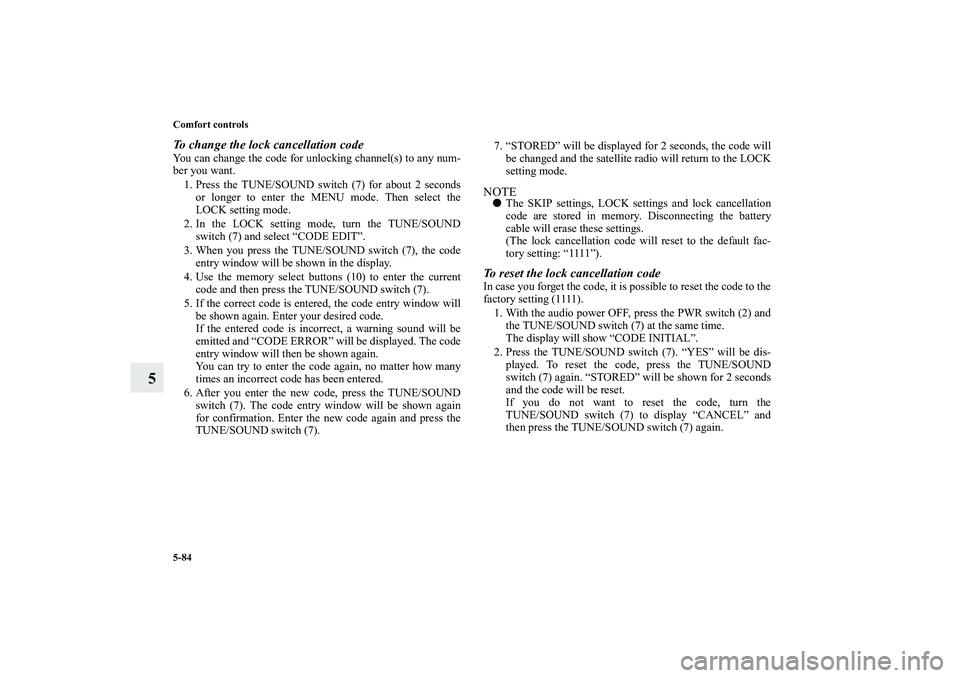
5-84 Comfort controls
5
To change the lock cancellation codeYou can change the code for unlocking channel(s) to any num-
ber you want.
1. Press the TUNE/SOUND switch (7) for about 2 seconds
or longer to enter the MENU mode. Then select the
LOCK setting mode.
2. In the LOCK setting mode, turn the TUNE/SOUND
switch (7) and select “CODE EDIT”.
3. When you press the TUNE/SOUND switch (7), the code
entry window will be shown in the display.
4. Use the memory select buttons (10) to enter the current
code and then press the TUNE/SOUND switch (7).
5. If the correct code is entered, the code entry window will
be shown again. Enter your desired code.
If the entered code is incorrect, a warning sound will be
emitted and “CODE ERROR” will be displayed. The code
entry window will then be shown again.
You can try to enter the code again, no matter how many
times an incorrect code has been entered.
6. After you enter the new code, press the TUNE/SOUND
switch (7). The code entry window will be shown again
for confirmation. Enter the new code again and press the
TUNE/SOUND switch (7).7. “STORED” will be displayed for 2 seconds, the code will
be changed and the satellite radio will return to the LOCK
setting mode.
NOTE�The SKIP settings, LOCK settings and lock cancellation
code are stored in memory. Disconnecting the battery
cable will erase these settings.
(The lock cancellation code will reset to the default fac-
tory setting: “1111”).To reset the lock cancellation codeIn case you forget the code, it is possible to reset the code to the
factory setting (1111).
1. With the audio power OFF, press the PWR switch (2) and
the TUNE/SOUND switch (7) at the same time.
The display will show “CODE INITIAL”.
2. Press the TUNE/SOUND switch (7). “YES” will be dis-
played. To reset the code, press the TUNE/SOUND
switch (7) again. “STORED” will be shown for 2 seconds
and the code will be reset.
If you do not want to reset the code, turn the
TUNE/SOUND switch (7) to display “CANCEL” and
then press the TUNE/SOUND switch (7) again.
BK0122500US.book 84 ページ 2010年5月12日 水曜日 午前11時11分
Page 571 of 714
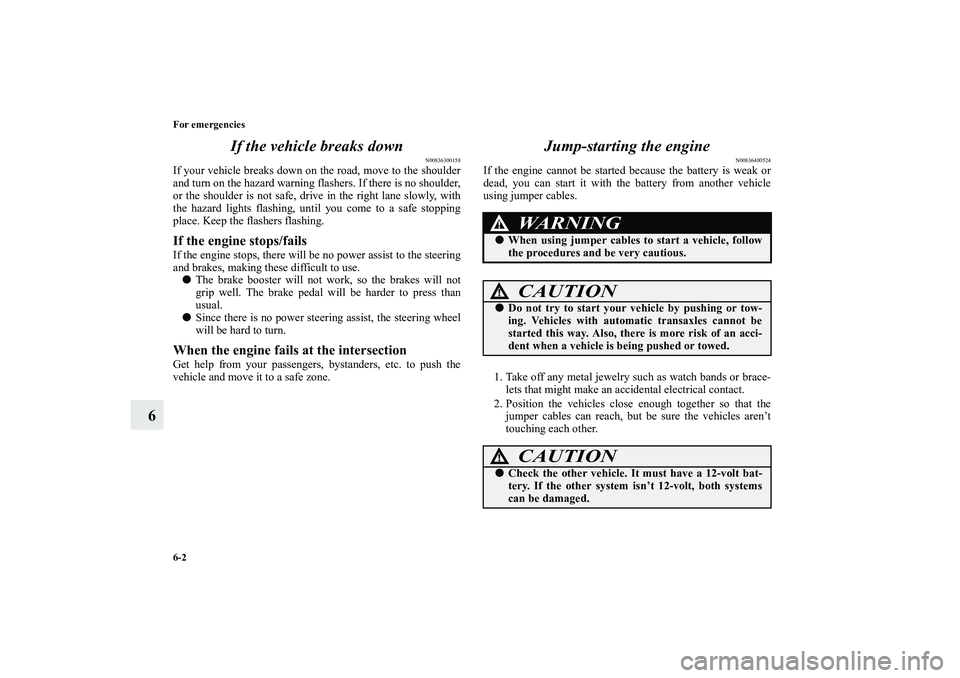
6-2 For emergencies
6If the vehicle breaks down
N00836300158
If your vehicle breaks down on the road, move to the shoulder
and turn on the hazard warning flashers. If there is no shoulder,
or the shoulder is not safe, drive in the right lane slowly, with
the hazard lights flashing, until you come to a safe stopping
place. Keep the flashers flashing.If the engine stops/failsIf the engine stops, there will be no power assist to the steering
and brakes, making these difficult to use.
�The brake booster will not work, so the brakes will not
grip well. The brake pedal will be harder to press than
usual.
�Since there is no power steering assist, the steering wheel
will be hard to turn.When the engine fails at the intersectionGet help from your passengers, bystanders, etc. to push the
vehicle and move it to a safe zone.
Jump-starting the engine
N00836400524
If the engine cannot be started because the battery is weak or
dead, you can start it with the battery from another vehicle
using jumper cables.
1. Take off any metal jewelry such as watch bands or brace-
lets that might make an accidental electrical contact.
2. Position the vehicles close enough together so that the
jumper cables can reach, but be sure the vehicles aren’t
touching each other.
WA R N I N G
!�When using jumper cables to start a vehicle, follow
the procedures and be very cautious.
CAUTION
!�Do not try to start your vehicle by pushing or tow-
ing. Vehicles with automatic transaxles cannot be
started this way. Also, there is more risk of an acci-
dent when a vehicle is being pushed or towed.
CAUTION
!�Check the other vehicle. It must have a 12-volt bat-
tery. If the other system isn’t 12-volt, both systems
can be damaged.
BK0122500US.book 2 ページ 2010年5月12日 水曜日 午前11時11分
Page 574 of 714
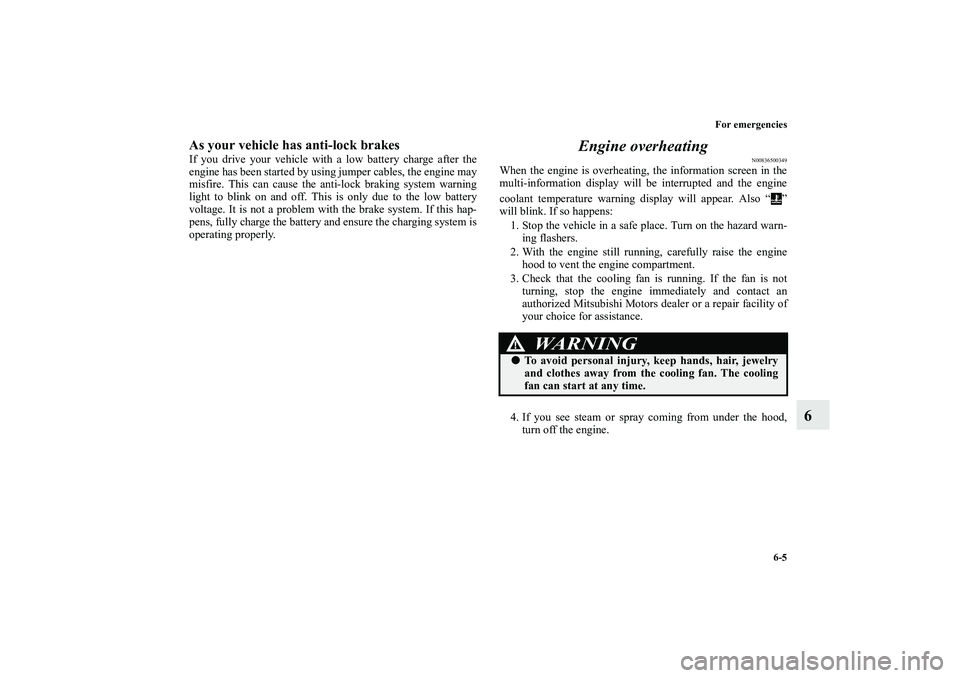
For emergencies
6-5
6
As your vehicle has anti-lock brakesIf you drive your vehicle with a low battery charge after the
engine has been started by using jumper cables, the engine may
misfire. This can cause the anti-lock braking system warning
light to blink on and off. This is only due to the low battery
voltage. It is not a problem with the brake system. If this hap-
pens, fully charge the battery and ensure the charging system is
operating properly.
Engine overheating
N00836500349
When the engine is overheating, the information screen in the
multi-information display will be interrupted and the engine
coolant temperature warning display will appear. Also “ ”
will blink. If so happens:
1. Stop the vehicle in a safe place. Turn on the hazard warn-
ing flashers.
2. With the engine still running, carefully raise the engine
hood to vent the engine compartment.
3. Check that the cooling fan is running. If the fan is not
turning, stop the engine immediately and contact an
authorized Mitsubishi Motors dealer or a repair facility of
your choice for assistance.
4. If you see steam or spray coming from under the hood,
turn off the engine.
WA R N I N G
!�To avoid personal injury, keep hands, hair, jewelry
and clothes away from the cooling fan. The cooling
fan can start at any time.
BK0122500US.book 5 ページ 2010年5月12日 水曜日 午前11時11分
Page 575 of 714
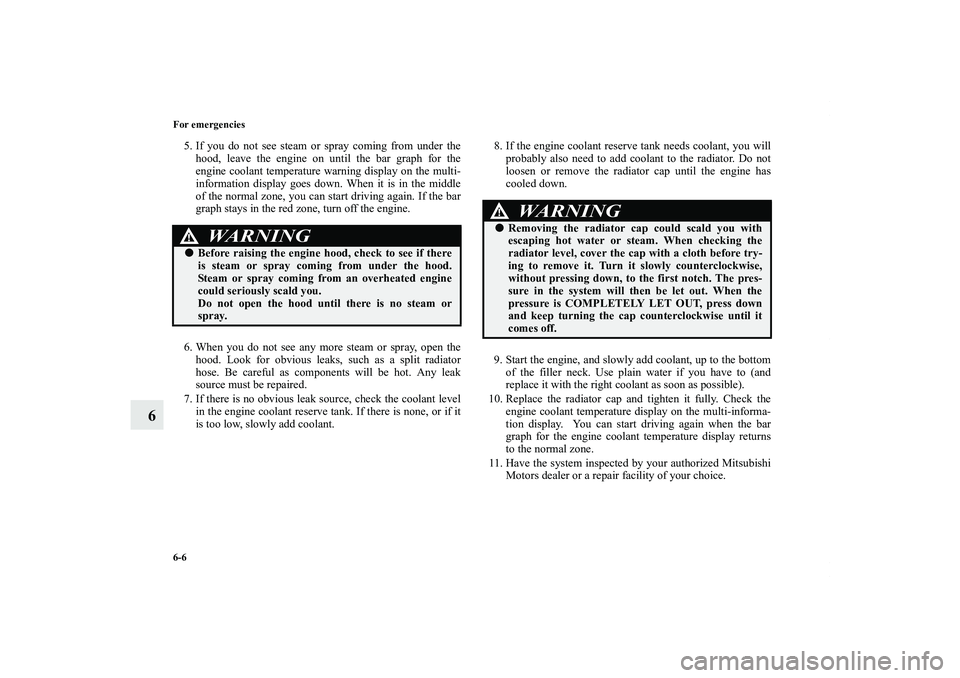
6-6 For emergencies
6
5. If you do not see steam or spray coming from under the
hood, leave the engine on until the bar graph for the
engine coolant temperature warning display on the multi-
information display goes down. When it is in the middle
of the normal zone, you can start driving again. If the bar
graph stays in the red zone, turn off the engine.
6. When you do not see any more steam or spray, open the
hood. Look for obvious leaks, such as a split radiator
hose. Be careful as components will be hot. Any leak
source must be repaired.
7. If there is no obvious leak source, check the coolant level
in the engine coolant reserve tank. If there is none, or if it
is too low, slowly add coolant.8. If the engine coolant reserve tank needs coolant, you will
probably also need to add coolant to the radiator. Do not
loosen or remove the radiator cap until the engine has
cooled down.
9. Start the engine, and slowly add coolant, up to the bottom
of the filler neck. Use plain water if you have to (and
replace it with the right coolant as soon as possible).
10. Replace the radiator cap and tighten it fully. Check the
engine coolant temperature display on the multi-informa-
tion display. You can start driving again when the bar
graph for the engine coolant temperature display returns
to the normal zone.
11. Have the system inspected by your authorized Mitsubishi
Motors dealer or a repair facility of your choice.
WA R N I N G
!�Before raising the engine hood, check to see if there
is steam or spray coming from under the hood.
Steam or spray coming from an overheated engine
could seriously scald you.
Do not open the hood until there is no steam or
spray.
WA R N I N G
!�Removing the radiator cap could scald you with
escaping hot water or steam. When checking the
radiator level, cover the cap with a cloth before try-
ing to remove it. Turn it slowly counterclockwise,
without pressing down, to the first notch. The pres-
sure in the system will then be let out. When the
pressure is COMPLETELY LET OUT, press down
and keep turning the cap counterclockwise until it
comes off.
BK0122500US.book 6 ページ 2010年5月12日 水曜日 午前11時11分
Page 579 of 714
6-10 For emergencies
6How to change a tire
N00836900747
Before changing a tire, first stop your vehicle in a safe, flat
location.
1. Park the vehicle on level and stable ground.
2. Be sure that the parking brake is firmly set and that the
selector lever is in the “P” (PARK) position.
3. Turn on the hazard flashers and turn the ignition switch to
the “LOCK” position.
4. Set up a warning triangle, flashing signal light, etc., at an
adequate distance from the vehicle, and have all your pas-
sengers leave the vehicle.5. To prevent the vehicle from rolling when it is raised on the
jack, place chocks or blocks (A) in front of and behind the
tire that is diagonally opposite from the tire (B) you are
changing.BK0122500US.book 10 ページ 2010年5月12日 水曜日 午前11時11分
Page 603 of 714
7-6 Vehicle care and maintenance
7
NOTE�If this does not close the engine hood properly, drop it
again from a slightly higher position.
�Do not push down strongly on the engine hood. Depend-
ing on how strongly or where you push down, you could
create a dent in the vehicle body.
�If you drive with the engine hood left open, warning dis-
play is displayed on the information screen in the multi-
information display.
Type 1 Type 2
BK0122500US.book 6 ページ 2010年5月12日 水曜日 午前11時11分
Page 642 of 714
Vehicle care and maintenance
7-45
7
Passenger compartment fuse location tablePassenger compartment fuse location
Sub fuse block Main fuse block
No.
Symbol
Electrical system
Capacity
1 Heater 30 A*
2Stop lights
(Brake lights)15 A
3 Rear fog light 10 A
4 Windshield wiper 30 A
5 Optional 10 A
6Door locks20 A
7Radio15 A
8 Control unit relay 7.5 A
9Interior lights
(Dome lights)15 A
10 Hazard warning flasher 15 A
11 Rear window wiper 15 A
12 Gauges 7.5 A
13Cigarette lighter
/Accessory socket15 A
14Ignition
Switch10 A
15 Sunroof 20 A
16 Outside rearview mirrors 10 A
17 All-wheel drive system 10 A
BK0122500US.book 45 ページ 2010年5月12日 水曜日 午前11時11分
Page 704 of 714
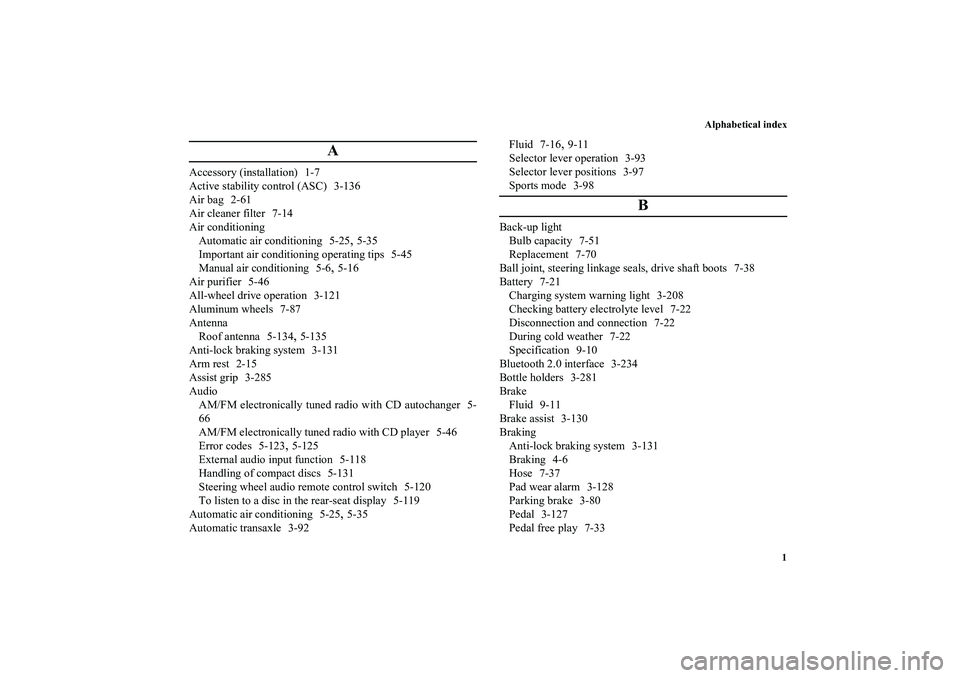
Alphabetical index
1
A
Accessory (installation) 1-7
Active stability control (ASC) 3-136
Air bag 2-61
Air cleaner filter 7-14
Air conditioning
Automatic air conditioning 5-25
,5-35
Important air conditioning operating tips 5-45
Manual air conditioning 5-6
,5-16
Air purifier 5-46
All-wheel drive operation 3-121
Aluminum wheels 7-87
Antenna
Roof antenna 5-134
,5-135
Anti-lock braking system 3-131
Arm rest 2-15
Assist grip 3-285
Audio
AM/FM electronically tuned radio with CD autochanger 5-
66
AM/FM electronically tuned radio with CD player 5-46
Error codes 5-123
,5-125
External audio input function 5-118
Handling of compact discs 5-131
Steering wheel audio remote control switch 5-120
To listen to a disc in the rear-seat display 5-119
Automatic air conditioning 5-25
,5-35
Automatic transaxle 3-92Fluid 7-16
,9-11
Selector lever operation 3-93
Selector lever positions 3-97
Sports mode 3-98
B
Back-up light
Bulb capacity 7-51
Replacement 7-70
Ball joint, steering linkage seals, drive shaft boots 7-38
Battery 7-21
Charging system warning light 3-208
Checking battery electrolyte level 7-22
Disconnection and connection 7-22
During cold weather 7-22
Specification 9-10
Bluetooth 2.0 interface 3-234
Bottle holders 3-281
Brake
Fluid 9-11
Brake assist 3-130
Braking
Anti-lock braking system 3-131
Braking 4-6
Hose 7-37
Pad wear alarm 3-128
Parking brake 3-80
Pedal 3-127
Pedal free play 7-33
BK0122500US.book 1 ページ 2010年5月12日 水曜日 午前11時11分